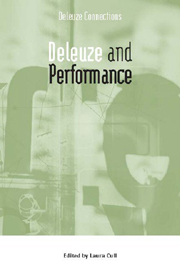Book contents
- Frontmatter
- Contents
- Introduction
- 1 Performing in the Chaosmos: Farts, Follicles, Mathematics and Delirium in Deleuze
- Act I Deleuze on Theatre: Artaud, Beckett and Carmelo Bene
- Interval
- Act II Confronting Deleuze and Live Performance
- 6 Becoming a Citizen of the World: Deleuze Between Allan Kaprow and Adrian Piper
- 7 sub specie durationis
- 8 Thinking Through Theatre
- 9 Becoming–Dinosaur: Collective Process and Movement Aesthetics
- Interval
- Act III A Digital Deleuze: Performance and New Media
- Notes on Contributors
- Index
7 - sub specie durationis
from Act II Confronting Deleuze and Live Performance
Published online by Cambridge University Press: 12 September 2012
- Frontmatter
- Contents
- Introduction
- 1 Performing in the Chaosmos: Farts, Follicles, Mathematics and Delirium in Deleuze
- Act I Deleuze on Theatre: Artaud, Beckett and Carmelo Bene
- Interval
- Act II Confronting Deleuze and Live Performance
- 6 Becoming a Citizen of the World: Deleuze Between Allan Kaprow and Adrian Piper
- 7 sub specie durationis
- 8 Thinking Through Theatre
- 9 Becoming–Dinosaur: Collective Process and Movement Aesthetics
- Interval
- Act III A Digital Deleuze: Performance and New Media
- Notes on Contributors
- Index
Summary
Latitude has not disappeared, nor is its disappearance imminent. This I propose, respectful of the threat posed by accelerated communication, as theorised by Paul Virilio with a mapmaker's care, to the latitudinal parallel, the imaginary east–west circle measured in degrees along meridians equidistant from the equator on representations of earth. What thought haunts each thinker? In considering latitude I have been haunted by that of Henri Bergson. The brain does not have thinking as its function but that of hindering the thought from becoming lost in dream; it is the organ of attention to life.
The Disappearance of Latitudinarianism Matthew Goulish
Last December I accepted an invitation to a holiday dinner hosted by a student and her family visiting from Oregon. I was touched by their inclusion of me, all the more so because my partner in life was away that week. At a point in the evening, my student's younger brother asked me, ‘Have you heard of Spore?’ I replied: a one-celled reproductive organism sent through the air by a mushroom. I was after all the teacher. It quickly became apparent that brother, father, stepmother, boyfriend and roommate all shared enthusiastic anticipation of a new non-competitive computer game by the engineer who brought us The Sims. The father explained that the player begins life as a spore and evolves to Western civilisation. ‘That must take some time’, I ventured. We can't know yet, he said, the release date passed two years ago, and the designer is still working.
- Type
- Chapter
- Information
- Deleuze and Performance , pp. 126 - 146Publisher: Edinburgh University PressPrint publication year: 2009

